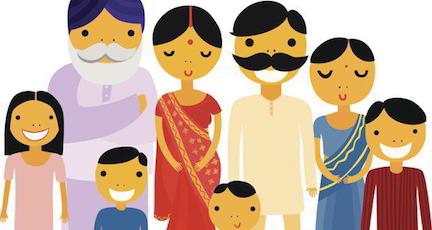Summary | Excerpt | Reading Guide | Reviews | Beyond the Book | Read-Alikes | Genres & Themes | Author Bio

This article relates to Ghachar Ghochar
 In Ghachar Ghochar, the narrator lives in a joint family, and it is really this sociological unit that has been the mainstay of Indian life for centuries.
In Ghachar Ghochar, the narrator lives in a joint family, and it is really this sociological unit that has been the mainstay of Indian life for centuries.
A joint family is defined as a unit of extended members of a family all living together under one roof, who also cook and eat together. Usually driven by patriarchal order, the patriarch and his wife and sons and their wives and children and so on form one group. A joint family is compared to socialism where each contributes according to ability and takes according to need. One of the common negatives against a joint family, is that it contributes to people being slackers. The narrator in Ghachar Ghochar for example, simply mooches off the family's collective earnings without making any money himself. Typically joint families have a common "god" that is worshipped. Property is usually divided equally among the male descendants.
In a country where social security nets are frayed if they exist at all, joint families act as insurance for aging parents and the infirm because they get taken care of. Widows and orphans are similarly attended to. A lack of privacy and infighting, especially over allocation of property, are said to be additional challenges of the joint family structure.
A joint family was better suited for India's agrarian society, where efficient division of labor for farm chores and a lack of good transportation contributed to members sticking together. This is, however, changing in the new India where the new jobs are in cities, forcing younger generations to migrate. Influx of western attitudes about individuality are also slowly eroding the joint family structure in India.
![]() This article relates to Ghachar Ghochar.
It first ran in the March 22, 2017
issue of BookBrowse Recommends.
This article relates to Ghachar Ghochar.
It first ran in the March 22, 2017
issue of BookBrowse Recommends.
Your guide toexceptional books
BookBrowse seeks out and recommends the best in contemporary fiction and nonfiction—books that not only engage and entertain but also deepen our understanding of ourselves and the world around us.